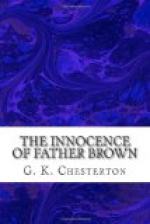“O sun,” cried the prophet, “O star that art too great to be allowed among the stars! O fountain that flowest quietly in that secret spot that is called space. White Father of all white unwearied things, white flames and white flowers and white peaks. Father, who art more innocent than all thy most innocent and quiet children; primal purity, into the peace of which—”
A rush and crash like the reversed rush of a rocket was cloven with a strident and incessant yelling. Five people rushed into the gate of the mansions as three people rushed out, and for an instant they all deafened each other. The sense of some utterly abrupt horror seemed for a moment to fill half the street with bad news—bad news that was all the worse because no one knew what it was. Two figures remained still after the crash of commotion: the fair priest of Apollo on the balcony above, and the ugly priest of Christ below him.
At last the tall figure and titanic energy of Flambeau appeared in the doorway of the mansions and dominated the little mob. Talking at the top of his voice like a fog-horn, he told somebody or anybody to go for a surgeon; and as he turned back into the dark and thronged entrance his friend Father Brown dipped in insignificantly after him. Even as he ducked and dived through the crowd he could still hear the magnificent melody and monotony of the solar priest still calling on the happy god who is the friend of fountains and flowers.
Father Brown found Flambeau and some six other people standing round the enclosed space into which the lift commonly descended. But the lift had not descended. Something else had descended; something that ought to have come by a lift.
For the last four minutes Flambeau had looked down on it; had seen the brained and bleeding figure of that beautiful woman who denied the existence of tragedy. He had never had the slightest doubt that it was Pauline Stacey; and, though he had sent for a doctor, he had not the slightest doubt that she was dead.




